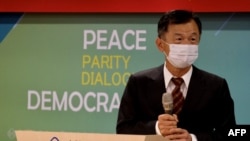The head of Taiwan's China policymaking Mainland Affairs Council (MAC,) Chiu Tai-san, will visit the United States in early September to meet officials and speak at two Washington think tank events with a focus on relations across the Taiwan Strait.
Meanwhile, the White House said China is continuing to try to set a "new normal" for its military activities toward Taiwan, including flying fighter jets over the median line in the Strait.
China opposes any meetings between officials from the U.S. and Taiwan, calling American lawmakers' and elected officials' interactions with Taiwanese officials "provocative" and a violation of Beijing's sovereign integrity.
Chiu will address the Brookings Institution on September 6 and deliver the opening remarks the next day at a seminar jointly organized by the Center for a New American Security (CNAS) and the Taiwan-based Prospect Foundation, according to a news release issued by MAC.
The release noted this is the 13th year of Taiwan-U.S. think tank cooperation. Such meetings are "usual" practices aimed at exchanging views on relations across the Taiwan Strait.
"We don't have any meetings to announce and would refer you to TECRO for information on possible Taiwan official travel to the United States," State Department deputy spokesperson Vedant Patel told VOA in a phone briefing Monday.
He was referring to the Taipei Economic and Cultural Representative Office (TECRO), Taiwan's representative office in the United States.
Neither TECRO nor the Chinese embassy responded to VOA’s requests to comment on Chiu's planned visit to the U.S.
Chiu's visit to Washington comes as China continues to ramp up military maneuvers around the Taiwan Strait following successive visits to the self-ruled island by U.S. House Speaker Nancy Pelosi; Senator Edward Markey, a Democrat and member of the Senate Committee on Foreign Relations; Indiana Governor Eric Holcomb, a Republican; and Senator Marsha Blackburn, a Republican and member of the Senate Committee on Armed Services.
White House National Security Council spokesperson John Kirby told reporters Monday that China is trying to "turn up the temperature" to a degree where the Chinese military's escalation in the Taiwan Strait becomes a "new normal."
"We've said publicly we're not going to accept it," Kirby told VOA.
"Two [U.S.] Navy cruisers [were] conducting Taiwan Strait transit in international waters [over the weekend]. We're going to continue to abide by international law. We certainly urge the Chinese to do the same," he said.
The U.S. Navy said the guided-missile cruisers USS Antietam and USS Chancellorsville conducted a "routine Taiwan Strait transit" on Sunday in accordance with international law. It's the first such operation since Pelosi's visit on August 2, although the U.S. Navy has been conducting similar passages regularly.
"These ships transited through a corridor in the Strait that is beyond the territorial sea of any coastal State. The ship's transit through the Taiwan Strait demonstrates the United States' commitment to a free and open Indo-Pacific. The United States military flies, sails, and operates anywhere international law allows," the U.S. 7th Fleet said on its website.
At the United Nations on Monday, Chinese Ambassador Zhang Jun called the U.S. Navy's Taiwan Strait transit "provocative."
"They [the U.S. Navy] should stop doing that, stop dragging the whole Taiwan Strait into high tension,” Zhang said. “For the United States, they should do whatever they can to commit their responsibilities in pursuing the One China principle."
For years, Washington has maintained its “One China” policy to guide its relations with Taiwan. This is different from Beijing's “One China” principle. The United States "acknowledged" but has never endorsed the Chinese Communist Party's claim of sovereignty over Taiwan.
Chinese officials have rejected the Taiwan Relations Act, calling the U.S. law governing its relations with Taiwan "illegal and invalid."
In April 2021, the State Department issued new guidelines for U.S. government interactions with its Taiwanese counterparts to encourage closer contacts and deepen the unofficial relationship between the two democracies.
The State Department said those guidelines liberalize guidance on contacts with Taiwan. They provide clarity and are in accordance with Washington's "One China policy.
VOA's Anita Powell, Margaret Besheer, and Paris Huang contributed to this report.




